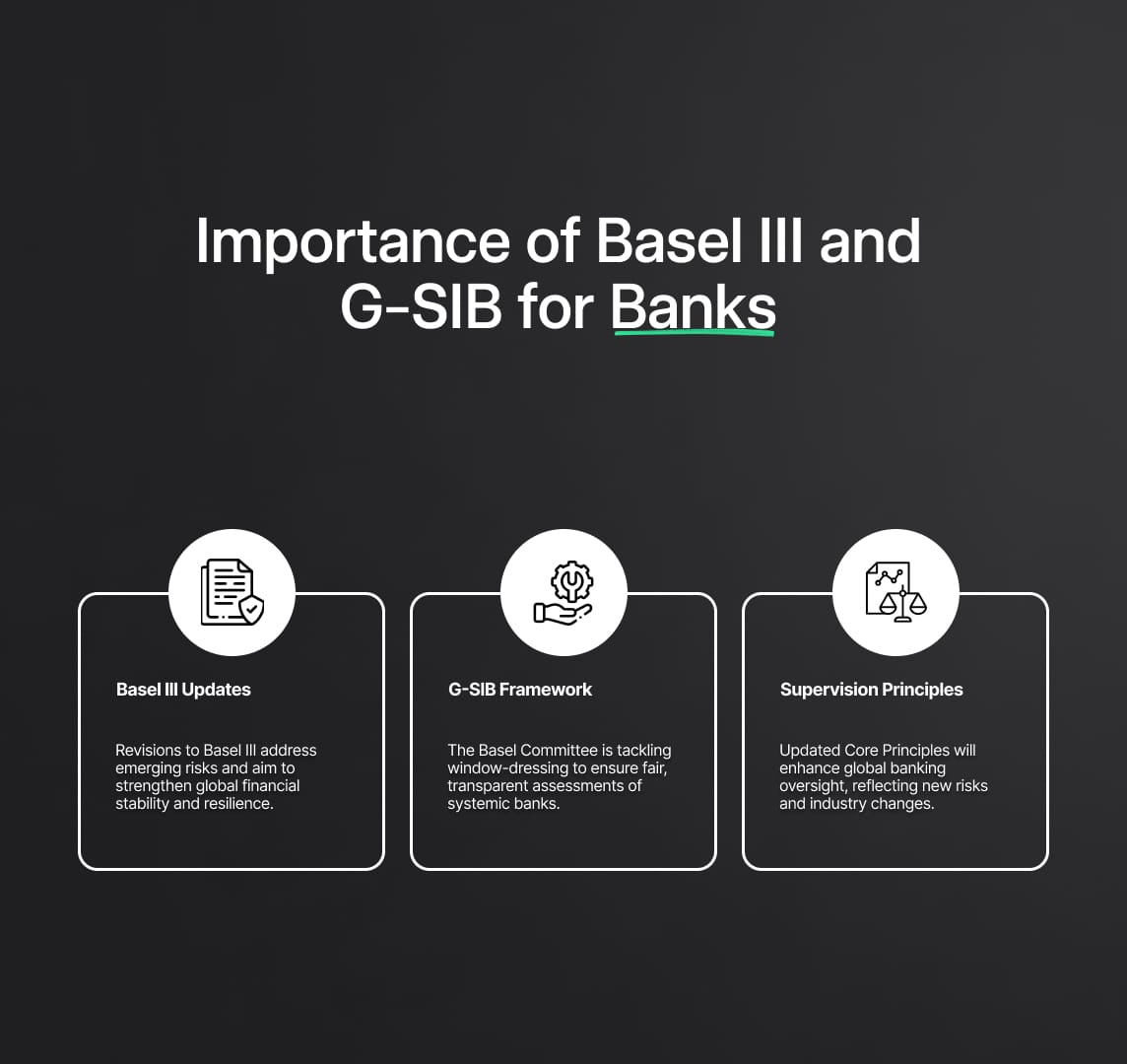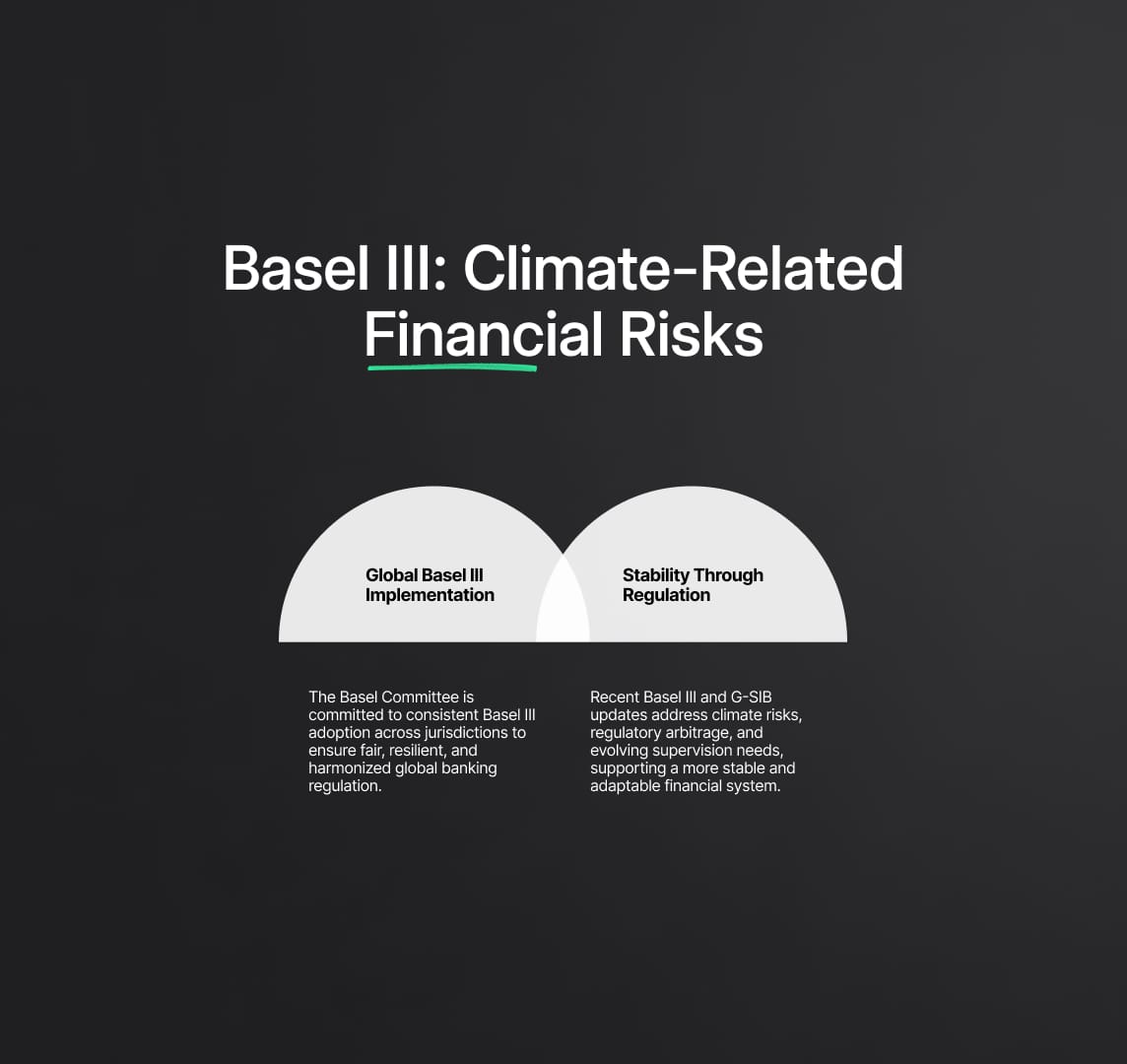Basel III and G-SIB Framework Enhancements
The Basel Committee has revised Basel III and G-SIB to strengthen global banking stability, with a focus on regulatory arbitrage, climate risks, and supervision. The goal is to promote a cohesive, robust financial system that fosters sustainable growth and maintains global financial integrity.

The Basel Committee on Banking Supervision is actively working on enhancing global banking stability through key initiatives, with a focus on updating the Basel III and G-SIB framework. These efforts aim to address regulatory arbitrage, improve banking supervision principles, and incorporate climate-related financial risks, ensuring a unified approach to banking regulation. The Committee is dedicated to ensuring the complete implementation of Basel III standards worldwide to establish a strong, transparent, and stable financial system. This strategic move is crucial in upholding global financial integrity, promoting sustainable growth, and strengthening the banking sector's resilience against economic challenges.
Source
[1]

In the rapidly changing finance sector, the Basel Committee on Banking Supervision leads the way in enhancing global banking regulation standards through updates to the Basel III and G-SIB frameworks. These changes aim to strengthen the resilience and stability of the global banking system, addressing challenges in regulatory compliance, risk management, and financial integrity in international markets.
Financial Landscape Evolution: Basel III and G-SIB Updates
The financial sector is known for its dynamic environment, facing frequent and complex challenges. In reaction, the Basel Committee on Banking Supervision has introduced extensive reforms to strengthen global banking oversight. These reforms, aligned with Basel III and G-SIB frameworks, focus on improving the resilience and stability of the financial industry globally.
This in-depth examination aims to delve into the core of these updates, offering understanding of their vital role in addressing regulatory challenges, improving risk management, and maintaining financial integrity worldwide. It strives to illuminate the complex influence of these changes on the banking sector, providing a clear view of their importance in shaping a secure and strong financial landscape.

The Significance of Basel III and G-SIB Framework in Modern Banking
With the financial landscape evolving, the Basel Committee's updates to Basel III and G-SIB frameworks play a vital role in strengthening the banking sector against global economic complexities. These changes are more than just regulatory adjustments; they represent significant shifts towards creating a stronger financial sector. The article delves into the importance of these updates in addressing various regulatory hurdles, improving risk management, and maintaining financial integrity globally.
These changes are crucial in guiding the worldwide banking industry towards a future where financial stability is not only sought after but accomplished. The article presents a detailed view on how the updates to Basel III and G-SIB framework play a fundamental role in ensuring and stabilising global financial markets amidst rapid changes and unexpected obstacles.
Basel III Framework: Foundations Improvement
The Basel III framework is a key element of contemporary banking rules, recently revised to address current issues in financial markets. The Basel Committee on Banking Supervision is dedicated to ensuring the consistent and prompt implementation of these reforms, aiming to enhance worldwide financial stability. Updates are designed to address a range of new risks, such as those posed by commercial real estate projects and the growing influence of non-bank financial institutions.
These extensive updates highlight the importance of ongoing vigilance and adaptability in the banking sector, to protect against economic uncertainties and financial instabilities. The Basel Committee stresses the need for a resilient and flexible banking industry in the face of changing global financial conditions, ensuring a secure foundation for the future.
Regulatory Arbitrage: Window-Dressing in the G-SIB Framework
The practice of window-dressing, where banks manipulate balance sheets temporarily to improve regulatory metrics, is a major concern for regulators. It undermines the core principles of transparent financial oversight, aimed at avoiding strict regulatory scrutiny. The Basel Committee is taking proactive measures by conducting targeted consultations and preparing detailed analyses to address and reduce these dishonest practices.
The Committee's dedication to maintaining the integrity and transparency of the G-SIB framework is demonstrated through this initiative. By ensuring accurate and fair assessments of banks' systemic importance, it helps prevent regulatory arbitrage, enhancing global banking supervision. These measures address window-dressing challenges and strengthen the overall banking regulatory framework for a more transparent, fair, and stable financial system.
Improving the Core Principles for Effective Banking Supervision
The Basel Committee on Banking Supervision has carefully revised the Core Principles for Effective Banking Supervision in preparation for changes in the global banking sector. These updates, to be released after the International Conference of Banking Supervisors in April 2024, are the result of consultations with various stakeholders in the financial industry. The aim is to strengthen the international banking supervision framework by incorporating recent supervisory knowledge and adapting to industry changes. This initiative is expected to greatly enhance the regulatory landscape.
These improvements aim to maintain a flexible and strong banking supervision system that can handle new financial risks. This proactive strategy enhances global banking regulations, keeping them up-to-date and effective in a constantly evolving financial environment. The Basel Committee's dedication to a secure and adaptable regulatory framework is evident in these strategic enhancements.

Basel III: Climate-Related Financial Risks
As climate change is increasingly seen as a key factor affecting financial stability, the Basel Committee is broadening its regulatory scope to address and control climate-related financial risks. An upcoming paper on using climate scenario analysis will provide crucial advice for banks and supervisory agencies. This effort is a major step towards taking a proactive approach to managing environmental risks in the banking industry.
The move to include climate-related financial risks in banking supervision reflects the Basel Committee's strategic goal for a sustainable financial future. This focus on sustainable financial practices aligns with global climate change initiatives and prepares banks for the financial impact of environmental changes. Emphasizing climate risks in banking supervision demonstrates a comprehensive effort to ensure the resilience and sustainability of the global financial system, advancing banking practices towards environmental stewardship.
Application of Basel III Standards Across the Globe
The Basel Committee reaffirms its dedication to implementing Basel III standards consistently in all member jurisdictions. Through a detailed work plan for jurisdictional assessments, the Committee aims to promote a harmonized global approach to banking regulation and supervision. This coordinated effort is essential for ensuring a fair regulatory framework, preventing inconsistencies that could jeopardize the integrity of the global financial system. Additionally, this consistency is vital for strengthening the resilience of the banking sector, enabling it to withstand financial disruptions and maintain stability in uncertain economic conditions.
Global Financial Stability Through Strategic Regulatory Initiatives
The Basel Committee has made significant changes to Basel III and G-SIB frameworks, prioritizing climate-related financial risks. These changes aim to address regulatory arbitrage, update core banking principles, and incorporate environmental risk into oversight mechanisms. This holistic strategy is a crucial step towards creating a stable, transparent, and adaptable financial ecosystem globally.
The Basel Committee plays a key role in strengthening and overseeing the banking system to support global finance stability and security, ensuring it can handle future challenges and opportunities. Their regulatory improvements are vital in shaping a strong financial framework that promotes sustainable growth and builds trust among stakeholders globally.
Reduce your
compliance risks

